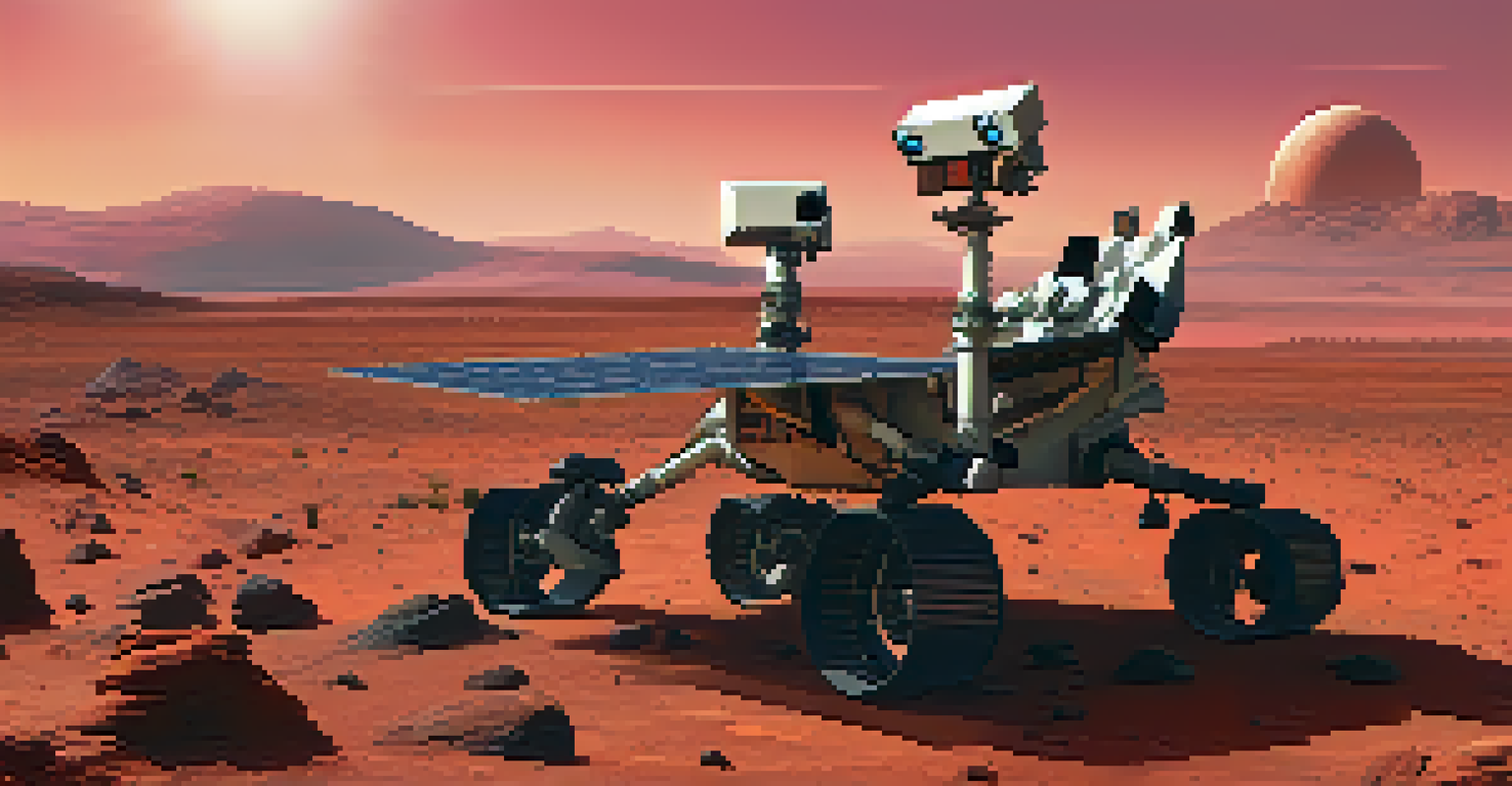Space Exploration: Hollywood's Interpretation of the Cosmos

The Allure of Space: Why Hollywood is Captivated
Space has always been a source of fascination for humanity, and Hollywood taps into this intrigue with powerful storytelling. The vastness of the cosmos invites endless possibilities, allowing filmmakers to craft narratives that stretch the imagination. From the mystery of black holes to the potential for alien life, these themes resonate with audiences, making space an attractive backdrop for cinematic adventures.
Space exploration is a force of nature unto itself that no other force in society can rival.
Movies like 'Interstellar' and 'Gravity' not only entertain but also provoke thought about our place in the universe. They challenge viewers to ponder profound questions about existence, time, and the future of humanity. This blend of entertainment and existential inquiry is what makes space exploration such a compelling subject for filmmakers.
Additionally, the advancements in CGI technology have made it easier to visualize the wonders of space. This ability to create stunning visual effects enhances the storytelling experience and allows audiences to feel as if they are truly part of the cosmic journey.
Classic Films: Paving the Way for Space Narratives
The genre of space exploration in cinema has deep roots, with classic films like '2001: A Space Odyssey' setting the standard. Stanley Kubrick's masterpiece not only showcased groundbreaking special effects but also explored themes of artificial intelligence and human evolution. Its influence can still be felt today, inspiring countless filmmakers to push the boundaries of storytelling.

Another classic, 'Star Wars,' introduced audiences to a galaxy far, far away, combining space exploration with elements of mythology and adventure. The franchise's success demonstrated that audiences craved escapism and heroism within the cosmos, blending science fiction with epic narratives.
Space: A Canvas for Storytelling
Hollywood uses the vastness of space as a backdrop to explore human stories, aspirations, and ethical dilemmas.
These early films laid the groundwork for future explorations of space in cinema, proving that space isn't just a backdrop; it's a canvas for human stories, aspirations, and fears.
Modern Interpretations: A Blend of Science and Fiction
In recent years, filmmakers have increasingly sought to fuse scientific accuracy with imaginative storytelling. Movies like 'The Martian' brought attention to the real challenges of space exploration, showcasing the ingenuity and resilience of the human spirit. This blend of fact and fiction not only educates audiences but also entertains them with relatable characters facing extraordinary circumstances.
The Earth is the cradle of humanity, but mankind cannot stay in the cradle forever.
Moreover, films such as 'Arrival' delve into the complexities of communication and understanding between species. By addressing themes of language and perception, these narratives elevate space exploration beyond mere adventure, urging viewers to consider the implications of contact with extraterrestrial life.
This modern approach reflects a growing interest in authentic science, encouraging writers and directors to collaborate with scientists for accuracy. As a result, viewers become more engaged and informed about the realities of space travel.
The Role of Technology in Shaping Space Narratives
Technology plays a crucial role in both the stories told and the ways they are presented. With advancements in visual effects, filmmakers can create breathtaking depictions of space phenomena, making the impossible seem tangible. This technological prowess enhances the viewer's experience, immersing them in the vast, uncharted territories of the universe.
Moreover, technology in storytelling extends beyond visuals. Virtual reality and interactive experiences are starting to emerge, allowing audiences to engage with space exploration in new ways. Imagine donning a VR headset to experience a journey through the rings of Saturn or a mission to Mars; this creates a level of immersion previously thought impossible.
Tech Advances Enhance Space Films
Innovations in visual effects and interactive technology immerse audiences in captivating and realistic space narratives.
As technology continues to evolve, so too will the narratives surrounding space exploration, offering filmmakers new tools to tell their stories and capture the imaginations of audiences worldwide.
Ethical Considerations: Space Exploration in Film
As space exploration becomes more prevalent in cinema, ethical considerations also come into play. Films often tackle questions about the impact of colonization, resource extraction, and the potential consequences of human actions in space. By presenting these dilemmas, filmmakers can provoke critical discussions about responsibility and stewardship beyond our planet.
Movies like 'Avatar' illustrate the ethical implications of exploiting alien worlds and their inhabitants. Such narratives serve as cautionary tales, reminding audiences that our actions in space may have far-reaching consequences both for other worlds and for Earth itself.
By weaving ethics into their stories, filmmakers encourage viewers to think critically about humanity's role in the universe, fostering a sense of accountability as we venture into the unknown.
The Influence of Space Exploration on Pop Culture
Hollywood's portrayal of space exploration has significantly influenced pop culture, inspiring books, merchandise, and even educational initiatives. Iconic phrases like 'to infinity and beyond' from 'Toy Story' have become entrenched in our cultural lexicon, showcasing how films can resonate beyond their narratives.
Moreover, franchises such as 'Star Trek' have inspired real technological advancements, pushing the boundaries of science. Its depiction of space travel and futuristic technology has motivated generations to pursue careers in science, technology, engineering, and mathematics (STEM).
Pop Culture's Space Exploration Impact
Films about space have significantly influenced pop culture, inspiring technological advancements and interest in STEM careers.
This interplay between cinema and culture highlights the power of storytelling, showing how films can shape our understanding of space and inspire future explorations.
The Future of Space Exploration in Film
As humanity stands on the brink of potential space colonization and exploration of Mars, the future of space narratives in film is ripe with possibilities. Filmmakers are likely to delve into new stories that reflect current events and technological advancements, offering fresh perspectives on our journey into the cosmos. Expect themes of sustainability, cooperation, and the ethical implications of human expansion into space to take center stage.
Additionally, with the rise of streaming platforms, audiences can anticipate a broader range of space exploration stories, including documentaries that examine real missions alongside fictional narratives. This merging of genres will cater to diverse interests and inspire curiosity about the universe.

Ultimately, the continued evolution of space exploration in Hollywood reflects our collective dreams and aspirations. As we look to the stars, filmmakers will undoubtedly be there, crafting narratives that inspire us to reach for the unknown.